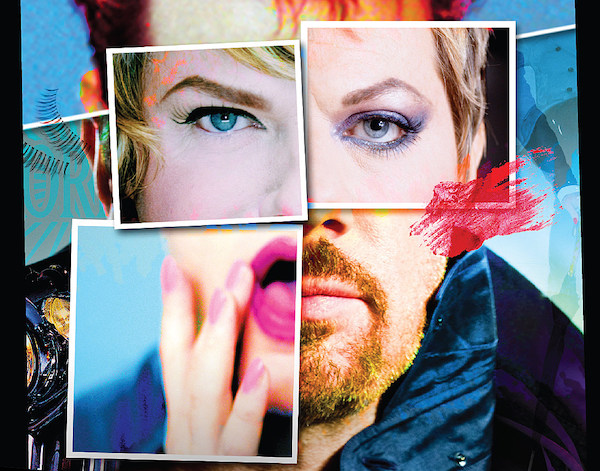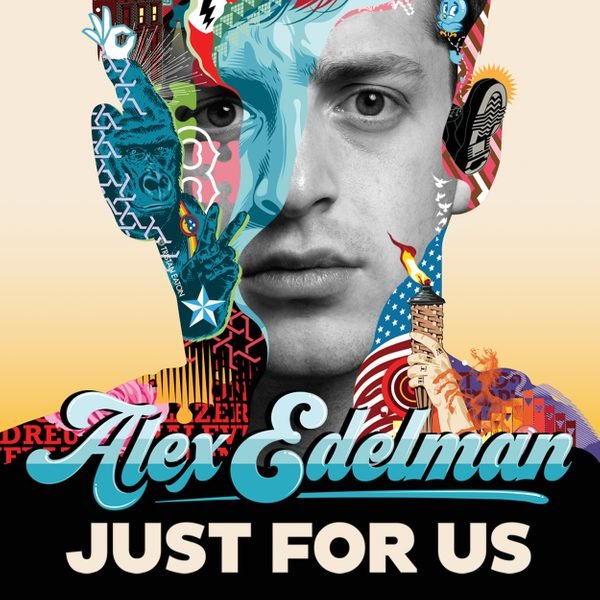This month, San Francisco audiences can see two of the brainiest comics currently working in full-length solo shows that have radically different structures. First, queer British entertainer Eddie Izzard comes to town with a shapeshifting evening of curlicued free-associative humor.
Then, rising star Alex Edelman arrives for four performances of “Just for Us,” his recent Broadway hit that mines unexpected hilarity in probing the limits of empathy, which takes on particular urgency in light of the Middle East’s recent turmoil.

Generous about identity
In a social media post this past March, the performer widely known as Eddie Izzard let it be known that they had begun to refer to themself as Suzy, a moniker they’d quietly wished for since childhood.
“Going forward I am preferring Suzy, but I don’t mind Eddie,” wrote Izzard. “And I prefer she/her, but I don’t mind he/him. So, no one can really get it wrong. Just follow the Golden Rule in how you treat people and you can’t get it wrong.”
For public appearances like Izzard’s three-night stand at the Orpheum Theater this week, she will still be billed as Eddie, though fans are welcome to use Suzy as well.
So be it, although for Izzard’s longtime followers, Polly might have been easier to remember.
After all, Izzard is polymorphous (Fluid in gender and job function, they work as a comedian, actor, author and activist), a polyglot (They perform shows in fluent English, French, German and Spanish and also speak several other languages), and, imminently, a politician.
Izzard, 61, is an announced Labour Party candidate — and likely frontrunner — in the 2024 election for a seat in the British parliament representing the Brighton Pavilion constituency in southeast England.
“I don’t want to be like one of these rock musicians who announces one farewell tour after another in order to get people to buy tickets,” said Izzard in a recent interview with the Bay Area Reporter, “but this is certainly my last tour before I go into politics. I am probably going to disappear from show business for a while, like Glenda Jackson did when she held office.”
Revisiting the hits
Farewell or not, the concept for Izzard’s current trek, called “The Remix Tour,” is very “Eras,” showcasing some of the most popular bits and routines from her past 30 years of shows.

This format is, in part, a matter of practicality. In addition to preparing for a political campaign, Izzard has spent much of the past year working on a one-man 21-character performance of Charles Dickens’ “Great Expectations” which played in England and Off-Broadway (The script is by Izzard’s brother, Mark); so, developing an evening’s worth of new material was off the table.
But Izzard, a passionate music fan who was recently thrilled to see the Beatles’ fine-tuning and adjustment of songs in Peter Jackson’s “Get Back” documentary, isn’t just pressing play and unspooling old schtick from memory.
“There are so many ways that bands do their hit songs,” said Izzard. “They can do it just like on the record or maybe Madonna will get up and do ‘Like A Virgin’ in the style of a German torch song.
“I went back through all the old videos to find certain key bits and punchlines that people responded really well to; but I need to find the comedy in them again for myself to keep it alive and keep it from being boring.”
To that end, as in all of his past tours, Izzard leans into improvisation, this time using vintage material as waymarks along a freeform path. While fans will recognize excerpts of former routines, including Izzard’s classic Death Star Cantina monologue, animal mimicry, and riffs on ancient Greece, they arrive with new twists.
Izzard’s feather-ruffling insistence on God’s non-existence, for instance, is updated with new proof points by way of the Covid pandemic.
“People cheer when I hit certain reference points,” said Izzard, “But I’m not interested in doing things exactly the same every night. Music can sometimes work that way with greatest hits, but going to hear music is fundamentally an emotional experience. Comedy is a mind gig.”
Indeed, Izzard’s loyal followers are among comedy’s most intelligent, able to keep up with her rollercoaster thought processes, which can swerve from erudite analysis of Shirley Temple to greenhouse gases to historical nitpicks about the Battle of Thermopylae.
“Look, there are about eight billion people on this planet, so if my stuff gets through to even a small percent of them,” says Izzard. “I’ve got an audience.”
Alex Edelman
Alex Edelman is happy to be referred to as a stand-up comedian.
But when his latest show, “Just for Us” had a limited (then extended) Broadway run this past summer, he was thrilled to be welcomed with open arms by the theater community.

It’s a shrewdly digressive 80-minute piece. Laugh-out-loud bits lead to moving insights as Edelman, who is Jewish, recounts his improvised infiltration of a white supremacist meeting, in his show which runs at The Curran Theater Oct. 26-28.
“I come from a club background,” said Edelman, 34, in a recent conversation with the Bay Area Reporter. “When you’re doing a seven- or ten-minute slot, the jokes have got to come first. But I’ve always loved hybrids that incorporate narrative.”
He points to Billy Crystal and Billy Connelly as early influences and to Mike Birbiglia — who co-produced “Just for Us” — as an important mentor in his development. “The key advice Mike gave me about my work,” said Edelman is “‘Make it more about you.”
Edelman also reaches beyond stand-up in considering how to craft his work. The Boston native attended New York University for an undergraduate degree in English, studying under novelists including Nathan Englander, Darin Straus, and Zadie Smith.
“They’ve all influenced my writing,” said Edelman. “You know how sometimes you’ll be reading a novel and it just starts to lag. I think about when I’m working on my shows. When you start with jokes to build a narrative, it’s got to retain a real propulsiveness. It can’t feel like reading a novel that has lulls in it. There can’t be any empty calories.”
Adelman feels that evolving and refining “Just For Us” over the course of five years and engagements in Europe and Australia has provided him with a depth of engagement with his material that might not have been possible following the typical stand-up comic’s path of developing and touring a brand new set every year or two.
“Not to get too nerdy,” he said, “But I’ve come to think that performing comedy can be divided into two parts, the content — your material — and the aesthetics; how you deliver it. After you work on the same show for a while, the overlap between those two things becomes profound: How does this line land differently if I say it upstage versus downstage? If I change the length of a pause, does the feeling of the joke change?”
In some sense then, the repetition/iteration of “Just For Us,” has helped transform the work from stand-up to theater.
“This show now has heft as well as laughs, but for people who are used to going to comedy clubs more than theater, believe me, if you’re giving me your time and your money, there’s no world in which I’m not going to provide you with a fun night out.”
